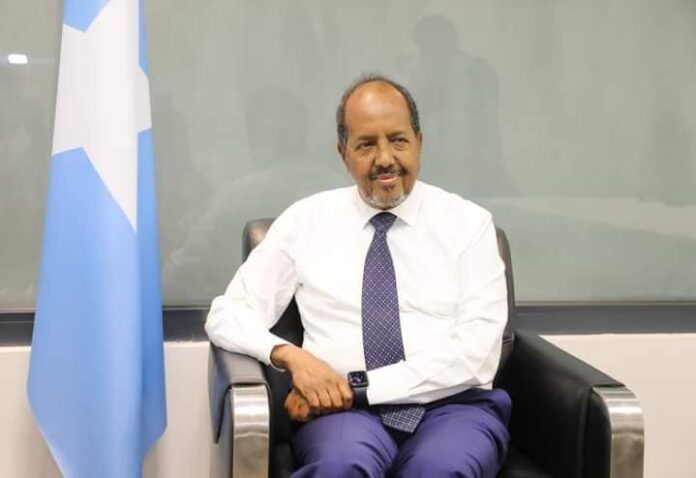Mogadishu (Kaab TV) – President Hassan Sheikh Mohamud’s first year in office marked tumultuous era of political instability, declining public trust, widespread corruption and arming clan militias amid strained relationships between the Federal Government of Somalia (FGS) and the Federal Member States (FMSs), according to a new report by Hiraal Institute.
The report published on Monday provides a comprehensive analysis of the first year of President Hassan Sheikh Mohamud’s term, examining the complexity of Somalia’s political, security, and regional landscape.
“The year was marked by significant political instability and challenges in the security sector. Despite expectations for improved political stability and FGSFMS relations, the administration’s approach fell short, particularly due to the exclusionary drafting of the NSArch, which risks alienating key FMSs,” the report said.
Al-Shabaab
The Al-Shabaab insurgency presents a growing challenge, with the group now more powerful and influential than in President Hassan Sheikh’s previous term, the report found. The government’s counterinsurgency campaign plans have been stalled by their unexpected commitment to aiding the Macawisley, extending the first phase of the campaign longer than initially planned.
“Today, Al-Shabaab appears wealthier, more influential, and more entrenched in both rural and urban areas nominally under government control. Al-Shabaab’s enhanced tax system now competes with the government’s own capabilities, indicating a robust financial structure that bolsters its operations,” it adds. “Moreover, the penetration of the security sector allows AS to carry out operations deep within the capital’s supposed safe zones, showcasing their strategic sophistication and resilience.”

While the government tried its best, it failed to dent the al-Qaeda-linked group’s operational tempo in the 12 months Hassan Sheikh has been president, the Hiraal Institute report found that the terror group managed to increase its improvised explosive attacks to 204, from 149; assassinations to 219 from 208; however, other attack types mostly stayed the same. The data suggests that the government’s current strategy is insufficient to curb Al-Shabaab’s activities, necessitating a more effective counterinsurgency approach.
Appointment of loyalists
President Mohamud made key appointments during his first year in power by rewarding political loyalists rather than merit or qualifications. This, according to the report, had significant implications for the functioning of public institutions and the public’s perception of government.
For instance the appointment of Mahad Salad, a publicly known instigator of the Badbaado Qaran uprising, as the Director-General of the National Intelligence and Security Agency (NISA), signifies a concerning trend of rewarding political loyalty over merit or qualifications.
The appointment of a media influencer, the owner of Mustqabal Radio, as the Auditor General, further hints at an attempt to control the narrative and information flow within the country. This could have implications for the transparency and accountability of government actions.
“These appointments may create a sense of nepotism and undermine public trust in these institutions, potentially affecting the government’s ability to effectively carry out its responsibilities,” the report noted.
Strained relations between Mogadishu and FMSs
The report further reviewed the relationship dynamics between the Federal Government of Somalia (FGS) and the Federal Member States (FMSs), particularly the southern states, are increasingly characterized by power centralization.
“The FGS’s unilateral decision to amend the Somali Provisional Constitution, extending the presidential term to five years, is a clear deviation from the constitutionally mandated participatory process involving the FMSs. This move, perceived as an overreach, has led to Puntland’s rejection of the process, casting a shadow on its legitimacy,” the report pointed.


